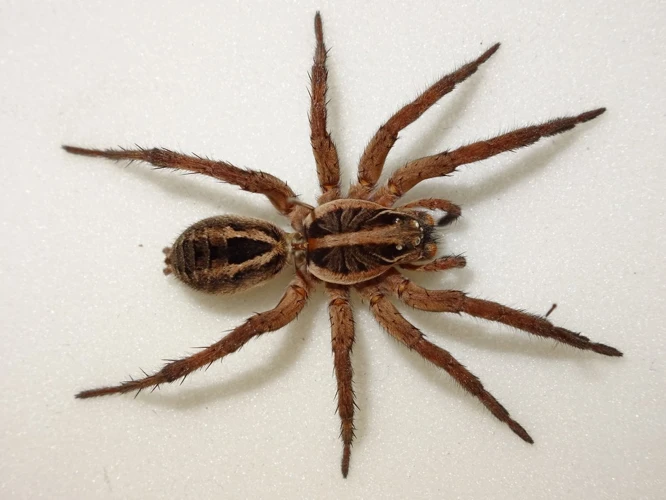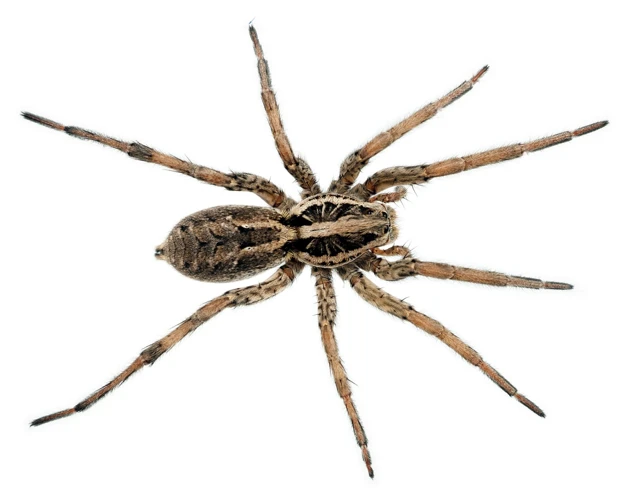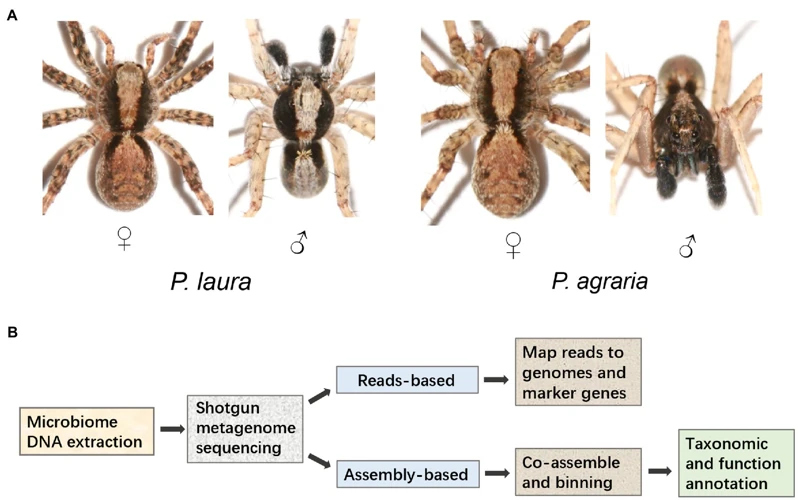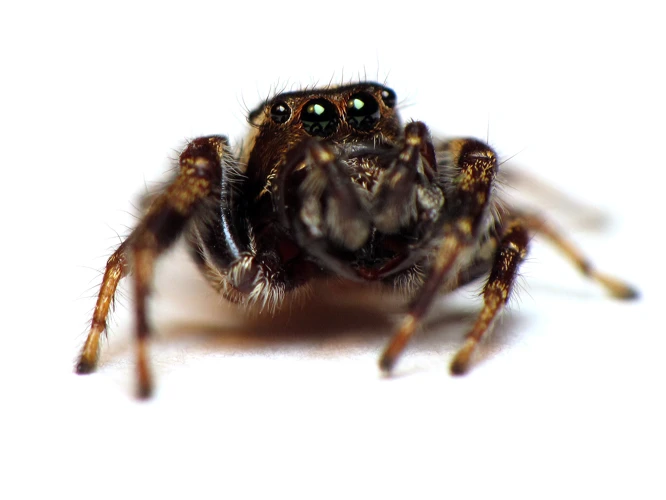It’s no secret that insecticides and pesticides are commonly used to eradicate pests, but what impact do they have on natural ecosystems? Specifically, how do these chemicals affect the populations of wolf spiders, which play a significant role in regulating insect populations? In this article, we’ll explore the potential dangers of insecticides and pesticides, and how they can harm wolf spider populations both directly and indirectly. We’ll also consider some alternative methods for pest control, as well as the importance of education and awareness when it comes to protecting these important predators. So, without further ado, let’s delve into the fascinating world of wolf spiders and the effects of chemicals on their populations.
What are Wolf Spiders?

Wolf spiders are a type of arachnid that roam the soil surface in search of prey. These fascinating creatures have gained popularity due to their unique appearance and impressive hunting abilities. They can be found around the world in a variety of habitats, from deserts to forests. However, as human populations expand and we encounter more pest problems, the use of insecticides and pesticides has become increasingly common. The question arises – what effects do these chemicals have on wolf spider populations and their habitats? Let’s explore the topic in more detail to better understand the risks and benefits associated with chemical pest control. For tips on safely using insecticides around wolf spiders, you can check this article.
Appearance and Characteristics
Wolf spiders are unique creatures that belong to the Lycosidae family and are found all over the world. They are named after their hunting habits, as they are known to hunt prey on foot. These spiders are easily recognizable due to their stout and hairy bodies, as well as their large eyes.
Size: These spiders come in various sizes depending on their gender and species. Generally, males are smaller than females and their size can range from a few millimeters to several centimeters.
Color: Wolf spiders vary in color from gray, brown, and black, to yellow or orange. Some species have distinctive markings on their body, such as stripes, spots, and bands.
Legs: They have long and agile legs that are covered with hair to help them sense their environment.
Venom: These spiders are venomous, but their venom is not harmful to humans and is only used to immobilize their prey.
As solitary creatures, they do not spin webs and instead rely on their speed and agility to hunt prey. They are also known for their maternal care as the females carry their egg sacs on their spinnerets until they hatch.
Understanding the characteristics and behaviors of wolf spiders is crucial for their conservation and protection in the face of the use of insecticides and pesticides. By choosing alternative methods such as bio-control or minimizing the use of harmful chemical agents, we can ensure the survival of these important creatures in their habitats. To learn more about the risks and benefits of using insecticides and pesticides on wolf spider habitats, check out this informative article here. Alternatively, visit this page to learn more about bio-control methods that protect wolf spider habitats here.
Behavior and Habitat
Wolf spiders are known for their unique behavior and habitat. They are fiercely independent and prefer to live and hunt alone. These spiders are also known to be active hunters. Instead of building webs to trap their prey, they actively pursue and capture their meals. This makes them a fascinating species to observe in nature.
Wolf spiders are commonly found in a wide range of habitats and ecosystems. They are found on every continent except for Antarctica. They thrive in a variety of climates, from hot and dry deserts to damp marshes and forests. They prefer to live in small burrows or crevices where they can remain hidden from predators.
Despite being solitary creatures, wolf spiders are social when it comes to their maternal instincts. Female wolf spiders are known to carry their egg sacs with them wherever they go. This behavior ensures the safety and survival of their young. However, during the egg-laying period, female wolf spiders become more aggressive and should be handled with caution.
Wolf spiders are fascinating creatures with unique behaviors and habitats. Their independence and active hunting style make them an important part of many ecosystems.
Role in the Ecosystem
Wolf spiders are an important part of the ecosystem, playing a crucial role in maintaining balance within the food chain. They act as both predator and prey, feeding on a variety of insects and serving as a food source for larger animals.
Table:
| Role | Description |
| —— | ———– |
| Predator | Wolf spiders prey on a wide range of insects, including beetles, flies, and mosquitoes. By doing so, they help to control the insect population, preventing outbreaks and maintaining ecological balance. |
| Prey | Wolf spiders are food for a variety of larger predators, including birds, lizards, and small mammals. Their presence in the ecosystem provides a valuable food source for these animals. |
| Soil Aeration | Wolf spiders are burrowing spiders, which means that they create tunnels in the soil. This process helps to aerate the soil, which is important for the growth of plants and the health of the ecosystem. |
| Nutrient Cycling | When wolf spiders die, their bodies decompose and release important nutrients back into the soil. This helps to maintain the health of the ecosystem and support plant growth. |
Wolf spiders play a vital role in the ecosystem, contributing to the health and balance of the food chain. Their presence helps to control the insect population, provide a food source for larger predators, and maintain soil health.
The Use of Insecticides and Pesticides

It’s no secret that the use of insecticides and pesticides has become an increasingly common practice in the world of modern agriculture. While these chemicals may serve as a quick solution to pest problems, the negative impacts they have on the environment go much farther than we often realize. The use of these chemicals has been shown to have devastating effects on beneficial insects and animals such as the wolf spider. Let’s take a closer look at the dangers of insecticides and pesticides and their effects on wolf spider populations.
Insecticide Use and Dangers
Insecticides are a common way to control insect populations, but their use can have negative consequences for wolf spiders. Insecticides are designed to kill insects quickly, but they can also harm non-target organisms, such as wolf spiders, that come into contact with the chemicals. Insecticides can be classified into several categories based on their chemical composition and mode of action. Some commonly used insecticides and their potential dangers to wolf spider populations are:
| Insecticide | Dangers to Wolf Spiders |
|---|---|
| Organophosphates | These insecticides are toxic to a wide range of organisms, including wolf spiders. They work by blocking an enzyme that is essential for nervous system function. Exposure to organophosphates can cause paralysis, convulsions, and death in wolf spiders. |
| Carbamates | Carbamates also work by disrupting nervous system function. These insecticides are less persistent than organophosphates but can still cause harm to wolf spider populations. Exposure to carbamates can cause tremors, convulsions, and other neurological symptoms in wolf spiders. |
| Pyrethroids | Pyrethroids are synthetic versions of a natural insecticide found in chrysanthemum flowers. They are often used to control pests in agricultural and residential settings. Pyrethroids can cause paralysis and death in wolf spiders, as well as other non-target organisms such as bees and butterflies. |
| Neonicotinoids | Neonicotinoids are systemic insecticides that are absorbed by plants and can persist in the environment for months or years. They are toxic to a wide range of insects, including pollinators and beneficial predators like wolf spiders. Neonicotinoids can cause developmental and reproductive problems, as well as immune system dysfunction, in wolf spiders. |
Wolf spiders are particularly vulnerable to insecticides because they are often found in agricultural and residential areas where these chemicals are heavily used. Wolf spiders are not specifically targeted by insecticides, so they may be inadvertently exposed to the chemicals through contaminated prey or habitat. The use of insecticides should be carefully considered and alternative methods of pest control should be explored to minimize the potential harm to wolf spider populations.
Pesticide Use and Dangers
Pesticides are another common chemical that is used to control pests in residential and commercial properties. Pesticides are designed to kill or repel a wide range of pests including insects, rodents, and weeds. However, the use of pesticides also poses a significant danger to wolf spider populations.
Potential dangers of pesticide use:
- Pesticides directly affect non-target organisms such as wolf spiders by poisoning them. This occurs when wolf spiders come into contact with pesticides on plants or other surfaces. As a result, wolf spiders are at risk of death or severe injury.
- Pesticides can also indirectly affect wolf spiders by killing their prey. When pesticides are used, they can wipe out the wolf spider’s source of food by killing the insects or other organisms they feed on. This can lead to starvation, reduced growth, and reproduction.
- Pesticides can also disrupt the habitat and life cycle of wolf spiders. When pesticides are used, they can alter the natural environment by eliminating vegetation or changing soil conditions. Wolf spiders rely on specific microhabitats to grow and reproduce. Changes to these habitats can be detrimental to their survival.
It’s important to note that the use of pesticides does not only affect wolf spiders but also other beneficial insects such as bees, butterflies, and ladybugs that contribute to the ecosystem’s balance. Pesticide use can have significant long-term effects on the environment and pose a risk to human health.
Instead of relying on pesticides, it’s essential to implement alternative pest control methods that are less harmful to wolf spiders and other non-target organisms. Adopting integrated pest management practices, using biological pest control, or utilizing traps can help control pests without harming wolf spiders and other beneficial organisms.
Educating the public on the dangers of pesticide use and promoting responsible pest control practices can help protect wolf spider populations and support a healthy ecosystem. By taking action to protect wolf spiders, we can also protect other wildlife, the environment, and our own health.
The Effects of Chemicals on Wolf Spider Populations

Scientists have long been studying the far-reaching impacts of chemical use on the environment. In particular, the use of insecticides and pesticides has been of great concern due to its potential to disrupt the delicate balance of ecosystems. In this article, we will explore the effects of these chemicals on wolf spider populations – an important predator in many ecosystems. By understanding the potential harm that chemical use can cause to the wolf spider population, we can begin to work towards more sustainable pest control practices.
Direct Poisoning
Direct poisoning of wolf spiders occurs when they come into contact with insecticides or pesticides that have been sprayed on crops, lawns or in households to control pests. This poisoning can have fatal consequences for wolf spider populations.
Various insecticides such as organochlorines, organophosphates, carbamates, and pyrethroids have been known to have harmful effects on spiders. Wolf spiders are particularly vulnerable because they spend most of their time on the ground where pesticides are mostly applied.
Direct poisoning can happen not only when wolf spiders come in direct contact with insecticides or pesticides but also when they consume prey that has been contaminated with these substances. This is possible since wolf spiders are predators and feed on other insects or small spiders.
When wolf spiders get infected with insecticides or pesticides, they may show symptoms such as disorientation, lethargy or paralysis. In some cases, death may occur within hours after exposure.
The list of insecticides and pesticides that can directly poison wolf spiders include:
– Lindane
– Chlorpyrifos
– Bifenthrin
– Cypermethrin
– Malathion
– Imidacloprid
It is important to note that the effects of these chemicals on wolf spiders may vary depending on the concentration and duration of exposure. It is essential to use insecticides and pesticides responsibly and follow safety guidelines provided by the manufacturer.
Alternative methods such as manual removal of pests, biological control, and the use of organic pesticides can be used as a safer way of controlling pest populations without harming wolf spiders in the process. It is crucial to consider these alternative methods to prevent direct poisoning of wolf spider populations and protect the ecosystem as a whole.
Indirect Effects on Prey
Chemicals used in insecticides and pesticides have indirect effects on prey, which ultimately results in a decrease in wolf spider populations. The prey of wolf spiders, such as insects and small arthropods, may be directly affected by the lethal or sublethal doses of insecticides and pesticides. Subsequently, the overall food availability of wolf spiders is reduced, making it difficult for them to survive and reproduce. This is particularly harmful during breeding seasons, where wolf spiders require a substantial amount of food to sustain themselves and their offspring.
The use of insecticides can lead to the development of insecticide resistance in the prey of wolf spiders. This resistance makes it increasingly difficult for wolf spiders to capture prey and can lead to further population decline. The persistent use of chemicals in pest control can also lead to the elimination of a certain species of prey. This directly affects wolf spiders as they rely on a diverse range of prey to maintain their population numbers.
The use of agricultural chemicals can also indirectly affect the availability of vegetation and foliage. This can have a devastating impact on the ecosystem, leading to biodiversity loss. The destruction of plant life can also lead to soil erosion, removing the necessary habitats and living areas of wolf spiders, causing a further decline in their population.
The adverse effects of insecticides and pesticides on prey can result in a domino effect on the wolf spider population. To protect these essential predators, it is crucial to limit the use of chemicals in pest control and adopt alternative methods of pest management. As consumers, we can also take necessary steps to protect wolf spiders by carefully choosing the products we use and reducing the use of toxic chemicals.
Disturbance of Habitat and Life Cycle
The use of chemical insecticides and pesticides not only directly affect wolf spider populations but also disrupts their habitat and life cycle. These chemicals are typically designed to target and eliminate specific pests, but they can also harm non-target organisms like wolf spiders.
Disruption of Habitat: Wolf spiders typically reside in soil, leaf litter, and other organic materials found on the ground. Insecticides and pesticides can easily permeate these environments, causing soil and litter to become contaminated. This can lead to a shortage of food sources when smaller insects or arthropods are eliminated by the chemicals, forcing wolf spiders to seek food elsewhere, and reducing their population over time. Chemical contamination can cause long-lasting damage to soil nutrients, harming plant growth and other essential ecosystem functions.
Disruption of Life Cycle: Chemicals can also interrupt the reproductive cycle of wolf spiders. Insects that are eliminated by the pesticides are often the main food source for wolf spiders. When these insects decline in numbers, wolf spiders may not have enough food to reproduce effectively, causing their population to decrease. Prolonged exposure to insecticides and pesticides has been shown to cause reproductive abnormalities in wolf spiders, leading to infertility and a decrease in population over a more extended period of time.
The use of insecticides and pesticides can profoundly impact the habitat and life cycle of wolf spiders. Chemicals can cause a reduction in food sources, disrupt soil health, and induce reproductive abnormalities, all of which can lead to a decline in wolf spider populations. Alternative methods of pest control should be used where possible, and education and awareness are crucial to maintaining healthy and balanced ecosystems.
Ways to Protect Wolf Spiders
As our understanding of the importance of wolf spiders in the ecosystem grows, it’s becoming increasingly clear that we must take measures to protect them. However, traditional pest control methods using insecticides and pesticides can pose a serious threat to these essential arachnids. So how can we protect wolf spiders while still managing pests? In this section, we’ll explore some alternative methods for pest control and discuss the importance of education and awareness in preserving these valuable species. Let’s dive in.
Alternative Methods for Pest Control
When it comes to controlling pests, there are several alternative methods that can be used instead of relying on insecticides and pesticides. These methods not only help protect wolf spiders but also have a positive impact on the overall ecosystem. Let’s take a look at some of these methods in detail:
| Method | Explanation |
|---|---|
| Biological control | Biological control involves the use of natural predators, parasites, and pathogens to control pest populations. This method can be used to control a wide range of pests, including insects, mites, and even weeds. |
| Cultural control | Cultural control involves modifying the environment to make it less suitable for pests to thrive. This can include practices such as crop rotation, sanitation, and proper waste disposal. |
| Mechanical control | Mechanical control involves physically removing or killing pests using traps, barriers, and other mechanical means. This method can be effective for controlling pests in small areas. |
| Chemical-free insecticides | Chemical-free insecticides, such as those made from plant oils or natural compounds, can be effective for controlling pests without harming wolf spiders or other beneficial insects. |
| Integrated pest management | Integrated pest management (IPM) is a holistic approach to pest control that combines multiple methods, including biological, cultural, and chemical control, to achieve long-term pest control while minimizing the use of harmful pesticides. |
By utilizing some of these alternative methods for pest control, we can reduce our reliance on harmful chemicals and help protect wolf spiders and other beneficial insects. It is important to note that while these methods can be effective, they may require more time and effort than simply using chemical pesticides. However, the long-term benefits to the environment and our health make it well worth the effort.
The Importance of Education and Awareness
It is important to educate people on the importance of wolf spiders and their role in the ecosystem. Many individuals are unaware of the benefits that wolf spiders provide, such as controlling insect populations. By raising awareness, we can help people develop a greater appreciation for these creatures and encourage them to take steps to protect them.
One way to increase education and awareness is through outreach programs. Organizations can hold workshops and events to teach people about wolf spiders and their importance. Strong communication and engagement can help motivate people to get involved and take action to protect them.
Another important aspect of education is teaching people about alternative methods for pest control. Many individuals rely on insecticides and pesticides as the default solution for controlling pests. However, non-toxic and natural methods can be just as effective without harming wolf spiders and other beneficial insects. By promoting these alternative methods, we can reduce the use of harmful chemicals and minimize the negative impact on wolf spider populations.
Education and awareness are crucial components of protecting wolf spiders. By promoting positive attitudes towards these creatures and alternative pest control methods, we can help ensure that wolf spiders continue to fulfill their important role in the ecosystem.
Conclusion
In conclusion, it is clear that the use of insecticides and pesticides can have a profound impact on wolf spider populations, as well as on the broader ecosystem. The indiscriminate use of such chemicals can lead not only to direct poisoning of spiders, but also to indirect effects on their prey and disruption of their habitat and life cycle. This can result in decreased numbers or even the complete disappearance of wolf spiders from affected areas.
However, there are ways to protect wolf spiders and other important members of the ecosystem from the harmful effects of insecticides and pesticides. Alternative methods of pest control, such as biological control and integrated pest management, can be effective in reducing pest populations without relying on harmful chemicals. Additionally, education and awareness campaigns can help to promote the importance of preserving natural habitats and the important role that wolf spiders play in our ecosystems.
It is important for both individuals and organizations to take action to protect wolf spiders and other important species from the dangers of insecticides and pesticides. By making informed choices and promoting sustainable practices, we can help to ensure the continued health and well-being of our planet and all its inhabitants. Let us all take responsibility for our actions and work towards a brighter, healthier future for all.
Frequently Asked Questions
What is the difference between insecticides and pesticides?
Insecticides specifically target insects, while pesticides are more general and can target a variety of pests.
Why are wolf spiders important in the ecosystem?
Wolf spiders play a key role in controlling insect populations, which helps maintain balance in the ecosystem.
How do insecticides and pesticides affect wolf spider populations?
Insecticides and pesticides can directly poison wolf spiders, indirectly harm them by reducing their prey populations, and disrupt their habitats and life cycles.
What are some common insecticides used in pest control?
Common insecticides include pyrethroids, neonicotinoids, and organophosphates.
What are some common pesticides used in pest control?
Common pesticides include herbicides, fungicides, and insecticides that target a variety of pests.
What are some alternative methods for pest control?
Alternative methods for pest control include physical barriers, such as screens and sealing cracks, and biological control, which involves introducing natural predators or parasites of pests.
What are some ways to protect wolf spiders?
Protecting wolf spiders involves minimizing the use of insecticides and pesticides, implementing alternative methods for pest control, and raising awareness about the importance of wolf spiders in the ecosystem.
Can wolf spiders be dangerous to humans?
While wolf spiders can bite humans, their venom is generally not harmful and causes only mild symptoms.
How can education and awareness help protect wolf spiders?
Education and awareness can help people understand the importance of wolf spiders in the ecosystem and the potential harm caused by insecticides and pesticides, leading to more effective and sustainable pest control methods.
What steps can individuals take to protect wolf spiders?
Individuals can take steps such as using alternative methods for pest control, minimizing the use of pesticides and insecticides, and advocating for the protection of wolf spiders and other beneficial insects.






